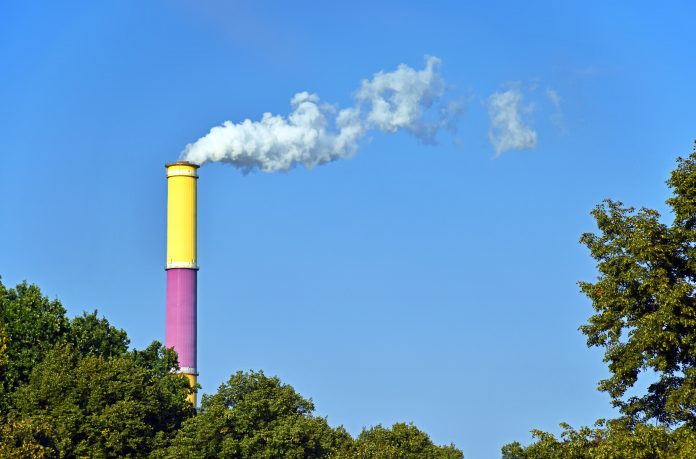Here, GERICS presents how they develop tools and solutions in interdisciplinary collaboration with 9 Helmholtz Centres for a roadmap to make Germany CO2-neutral by 2050
The Paris Agreement and its ambitious undertaking of combatting climate change, with its limit to global warming of well below 2°C, has the explicit target of achieving a balance between anthropogenic emissions and removal of greenhouse gases in the second half of the century. Indeed, all available scenarios consistent with the 2°C temperature goal require reaching net-zero CO2 emissions globally by mid-century. (1)
Some nations have already adopted or are in the process of adopting national strategies to reach net-zero CO2 emissions by 2050 or earlier. With its new Climate and Energy package, Germany has also committed to become extensively greenhouse gas-neutral by 2050. However, the associated measures are not ambitious enough and are far from being consistent with holding warming to below 2°C. Faced with such a lack in action towards reaching the climate goals and policy stagnation, the project Net-Zero-2050 was launched on July 1 2019 as part of the Helmholtz Climate Initiative. The Climate Service Center Germany (GERICS) coordinates Net-Zero-2050 and, thus, brings together the expertise of ten Helmholtz research centres across Germany (see Box 1).
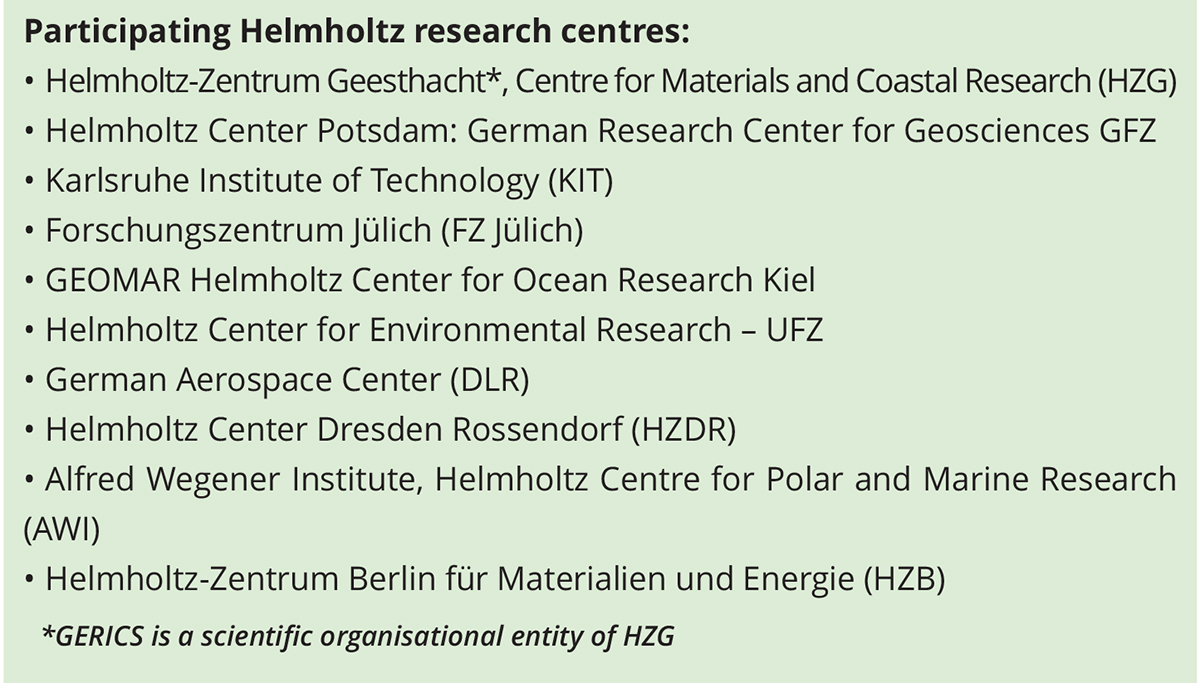
Methods and ideas
Net-Zero-2050 aims at addressing and mapping out the key issues, examining methods and ideas proposed so far, and moving forward promising technologies, relevant for developing a national net-zero strategy. Various approaches to reduce CO2 emissions, to capture, store or convert CO2 from point sources, and to remove CO2 from the atmosphere via nature-based approaches are currently assessed comprehensively with respect to potential, economic and social feasibility, scalability and side effects, as well as possible vulnerabilities to climate change. Thus, Net-Zero-2050 acts as an interdisciplinary pilot study to scientifically underpin the development of a roadmap towards a net-zero Germany by the mid-century. It is organised as follows (see Figure 1):
Project 1 (P1) is the governing project and hosts the coordination. It combines work carried out by assessing mitigation and CO2 removal options towards a national roadmap net-zero (P1.1) and by integrated scenario development and analyses (P1.2), both of which inform each other and iteratively single out the most promising scenarios and roadmap. Moreover, both subprojects integrate scientific findings from the other three projects to underpin their efforts.
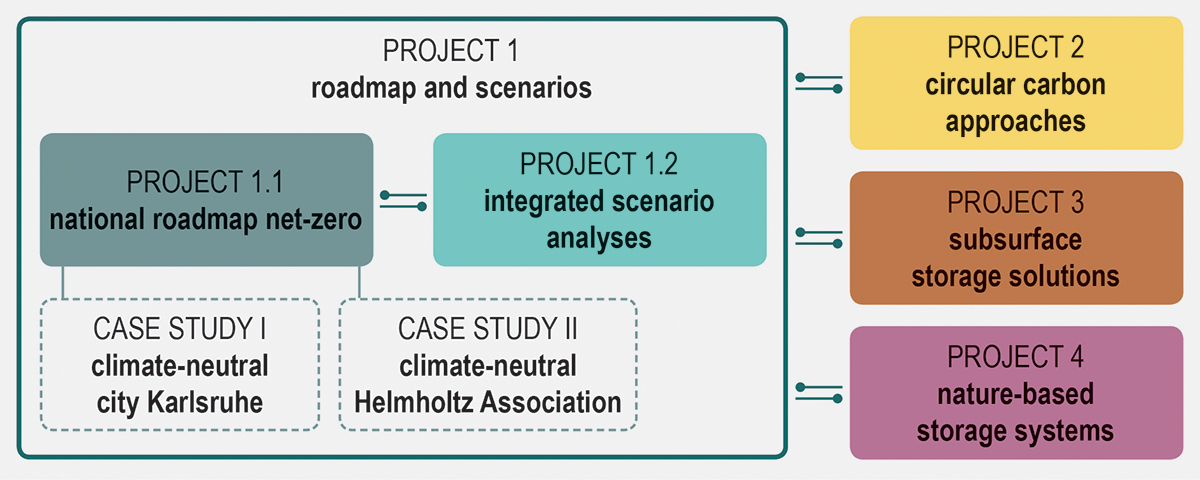
Projects 2 to 4 (P2, P3, P4) represent the cluster’s technological level. Thus, bottom-up evaluations are performed, regarding technological, economic, systemic and ecological constraints of CO2 removal and CO2 conversion into products such as synthetic fuels (P2), the storage of various forms of energy and substrates required for CO2-neutral cycles (P3) and the removal of CO2 by nature-based solutions (P4).
Case Study I represents Net-Zero-2050’s main bridge to society. In Karlsruhe, one of Germany’s pioneering cities in climate neutrality, two workshops are planned in which members from different sectors will discuss the technologies and approaches of P2-P4 concerning their social acceptance and expected political feasibility.
Case Study II aims at the development of a transparent strategy towards a climate-neutral Helmholtz Association.
Move forward the public and political debate
By assessing the currently most promising contributions towards a national net-zero roadmap and by transparently displaying results of research, Net-Zero-2050 aims to inform and move forward the debate about CO2-neutrality at various levels. It is expected that this can initiate a quest for the best ideas, which then could be tested and offer opportunities to society and industry while helping Germany to deliver climate action adequately.
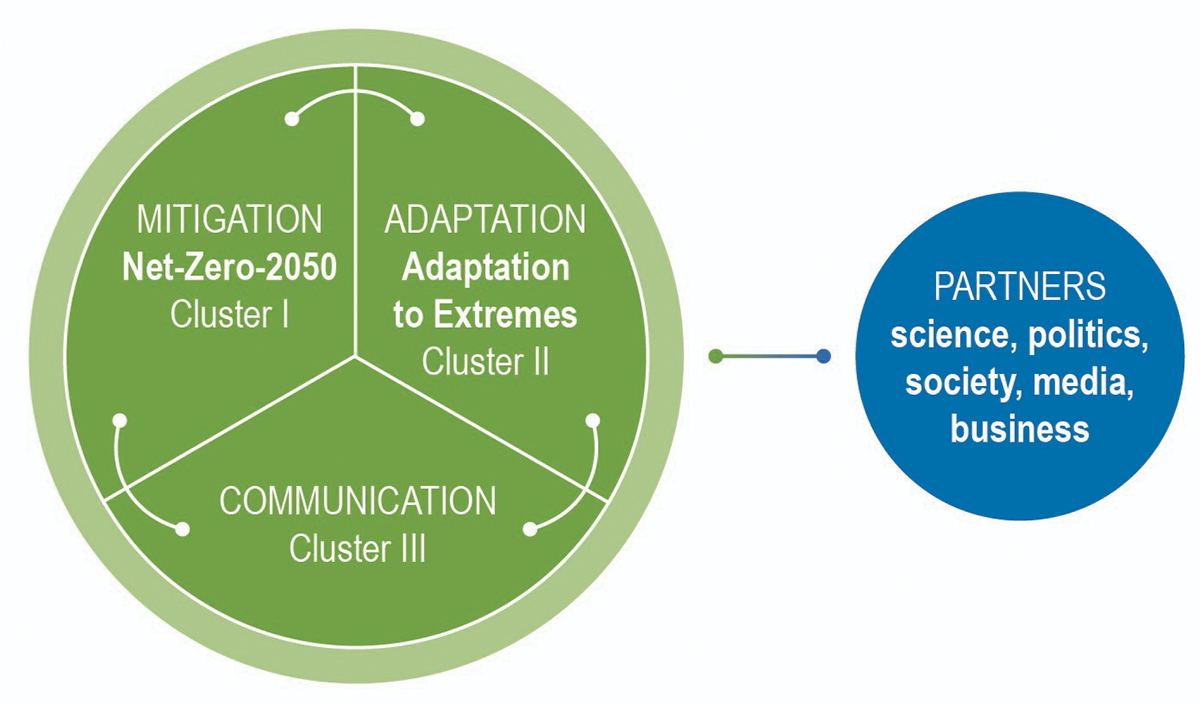
Net-Zero-2050 is part of the Helmholtz Climate Initiative, which is divided into three collaborating clusters (see Figure 2). The Helmholtz Climate Initiative aims to systematically research the topic of climate change and actively seeks dialogue with external partners (see Box 2). It is funded by the Helmholtz Association’s Initiative and Networking Fund.
In its Special Report on Global Warming of 1.5ºC, the Intergovernmental Panel on Climate Change (IPCC) states that net-zero CO2 emissions are achieved when anthropogenic CO2 emissions are balanced globally by anthropogenic CO2 removals over a specified period.
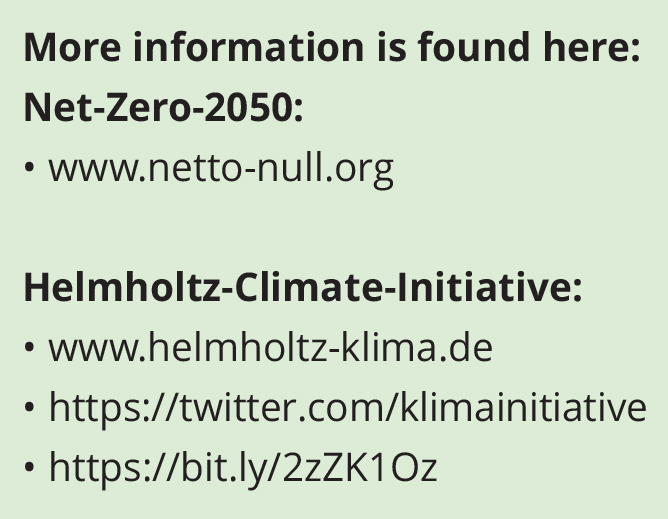
Participating Helmholtz research centres:
Helmholtz-Zentrum Geesthacht*, Centre for Materials and Coastal Research (HZG)
Helmholtz Center Potsdam: German Research Center for Geosciences GFZ
Karlsruhe Institute of Technology (KIT)
Forschungszentrum Jülich (FZ Jülich)
GEOMAR Helmholtz Center for Ocean Research Kiel
Helmholtz Center for Environmental Research – UFZ
German Aerospace Center (DLR)
Helmholtz Center Dresden Rossendorf (HZDR)
Alfred Wegener Institute, Helmholtz Centre for Polar and Marine Research (AWI)
Helmholtz-Zentrum Berlin für Materialien und Energie (HZB)
*GERICS is a scientific organisational entity of HZG
More information is found here:
Net-Zero-2050:
Helmholtz-Climate-Initiative:
Twitter: @klimainitiative
Please note: This is a commercial profile

